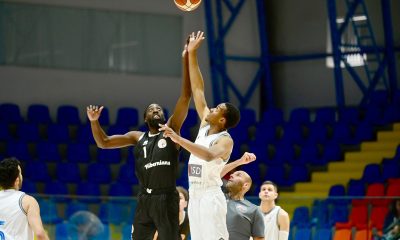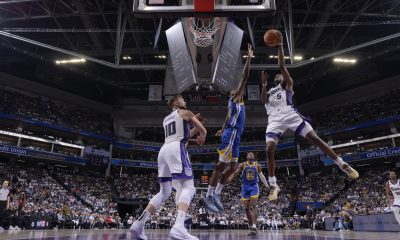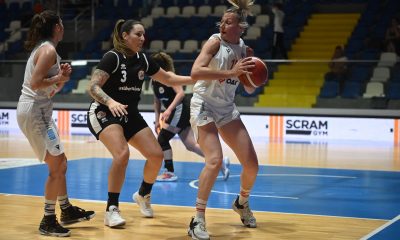
The new basketball season is upon us and following last Sunday’s Super Cup finals for both men and women, the season kicks off this weekend with the Malta Basketball Association (MBA) Shield.
This season will see the Shield take on a new experimental format where a team must score 75 points first to win the game. Speaking to the Times of Malta, MBA president Paul Sultana said it would be a trial run to create new ways of playing the game.
“Because we have four competitions, and not many teams, one would appreciate more ways to make the game more interesting, appealing, and competitive. In this way, one would need to play harder and think a bit more outside the box,” Sultana said.
This new format, formally referred to as the Elam Ending, was first used in the US in 2017 but its greatest proof of success was when the NBA’s All-Star Game adopted the format in 2020, albeit only in the fourth quarter of the showcase fixture involving NBA players chosen by the general public through voting across the league.
This could be an impetus for teams to rethink their play-calling and could even bring different teams to the spotlight, as did last season’s unfortunate tanking incident at the end of the regular season – sending Mellieħa Libertas into the finals against Starlites FIJO.
While Mellieħa were clear underdogs in last season’s finals against Starlites, the latter winning the series with a clean sweep, this was not the case last Sunday when the two teams faced each other again in the Super Cup.
Asked about this, Sultana said it is a big plus for the game to have teams like Mellieha challenging for titles.
“It is a significant plus in my opinion because (Mellieħa) have submitted two under-16 teams, and now will also be taking part in the Under-14 and Under-12 this season – they have a good setup,” he admitted.
“The beautiful thing about it is that they represent a town and on Sunday they had an area full of local children supporting their team. It’s a pity that the team’s main import player got ejected midway through the game, but they kept on fighting, nonetheless.
“It’s a good sign they have such characteristics – when you have a town’s team, the locals will want to play for their hometown.”
Malta’s basketball season is coming off the back of last summer’s FIBA Small Countries Championship on homecourt where the packed court the Ta’ Qali pavilion was one of the highlights of the tournament. For the ensuing Super Cup, this was unchanged as Malta’s community appeared to want more.
“After the Europeans (FIBA Games), on Sunday we saw Ta’ Qali as full as ever. We had the finals for both men and women and the number of people who showed up was more than expected. Credit to the clubs for bringing more supporters, and this is increasing the level of interest in the game,” Sultana explained.
“I think there was a carry-over from the enthusiasm the summer’s Games created and it remained inside of us Maltese – we want the game now more than ever. This will also be a good build-up for the Small Nations Games (GSSE) in May.
“There was a big need for last summer’s games to be held here. Usually, we would have to hear about the scores from abroad because we couldn’t host anything here at what was the hangar. FIBA would have never accepted us hosting a tournament there.
“The closest thing we’ve ever had was an Under-16 girls tournament and even that was held at the National Sports School instead of Ta’ Qali. Now we have managed to host a fantastic tournament and we have received praise even from FIBA themselves.”
Asked about this coming season’s logistics concerning the GSSE, also being held in Malta in 2023, Sultana admits it was a logistical challenge to fit everything in before the start of the Games.
“It was a tough feat to fit in every game, considering the fact that in the youth section, there are now more teams. The number of games has increased but the advantage we have now is that post-COVID-19, the time between one game and the other has been reduced,” he said.
Import players
“We usually plan on starting the league later than it actually does, so that if clubs wanted to bring in their import players later than October to help their expenses, they could. However, one can see that most of the clubs have already brought in their foreign players and we have watched some of them play on Sunday.”
Division Two side Fusion Basketball Club announced in August they would be inserting a new women’s team into the league, a selection of foreign players residing in Malta. Of course, with Malta’s women’s league regulations stating that only one import player is allowed on the court at one time, this created an issue within the league.
“The team is made up of Serbian players who wanted to take part in the league but due to the fact that our league allows just the one foreigner on the court at a time, we let them play out of competition,” Sultana said.
“It is an experiment for the season and if it turns out well, we can eventually look at adapting the regulations or asking them to include more local players.
“The reality is that one-fourth of the population here is foreign and people coming from these areas have a culture of playing basketball, and so we can’t exclude them. Besides this, these people help basketball in different ways.
“There are foreigners living here who contribute to the local sport – sometimes we don’t always need to bring in coaches and players from abroad because there are people readily available here already. Either way, the situation is evolving, and we must evolve with it for the benefit of basketball.”

World Cup News
-
FIFA World Cup
/ 1 month agoSon scores but Thailand hold South Korea in World Cup qualifier
Son Heung-min scored but South Korea were held 1-1 at home by Thailand in...
By AFP -
FIFA World Cup
/ 1 month agoJapan-N. Korea World Cup game to stay in Pyongyang, JFA says
Japan’s World Cup qualifier against North Korea will be played in Pyongyang as planned...
By AFP -
FIFA World Cup
/ 2 months agoGerman ex-FA bosses on trial over World Cup tax evasion
Three German ex-top football officials went on trial on Monday in a 13.7-million-euro ($14.8...
By AFP -
FIFA World Cup
/ 2 months agoSaudi Arabia formally launches bid for 2034 World Cup
Saudi Arabia formally launched its bid to host the 2034 World Cup on Friday,...
By AFP

Coppa Italia
Milik fires Juventus into Italian Cup final

English Premier League
Five-star Arsenal thrash Chelsea to open up Premier League lead

American Football
NFL Chiefs extend contracts for coach Reid, top execs

English Premier League
Feyenoord boss Slot leading race for Liverpool job – reports

English Premier League
Unai Emery extends Aston Villa contract

English Premier League
Watch: Ten Hag says reaction to Manchester United FA Cup win a ‘disgrace’

English Premier League
Nottingham Forest to get access to VAR audio after penalties furore

BOV Premier League
Ten Maltese clubs awarded UEFA License

Winter Olympics
Watch: Geisenberger wins sixth Olympic medal to tie luge record


































